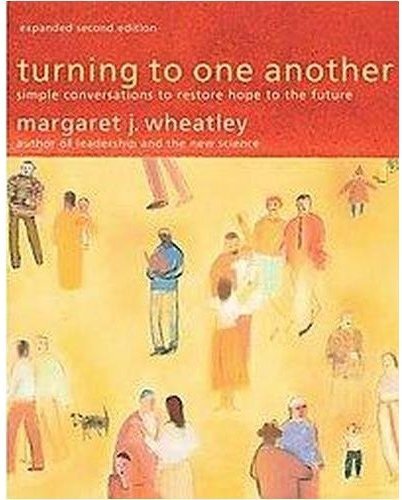Margaret J. Wheately, Turning to One Another: Simple Conversations to Restore Hope and Future. Expanded Second Edition Berrett-Koehler Publishers, 2009.
Referenced in:
- Church Conflict – Communication, Healthy Behavior, Forgiveness
- Church Leadership Strategies – Large Group, Whole Systems
LifeandLeadership.com Summary
This is an interesting book that was partly encouraged by 9/11 and the growing forms of unrest and conflict within larger society, both locally and globally. It is now in an expanded edition from the first publication in 2002. The author, Margaret Wheately, also wrote Leadership and the New Science.
This is not a how-to workbook. It is a slower, thoughtful, and postmodern reflection on how the human community may have conversations that reach beyond our diversity and allow deep understanding as a basis for social change. In the author’s own words, “The intent of this book is to encourage and support you to begin conversations about things that are important to you and those near you.” It has application for the full range of communicative situations, from interpersonal to corporate to political. The value for church leaders is as a preparatory resource that assigns great meaning and hope to discussing issues that reflect cultural diversity. These issues have the potential for destructive conflict as well as constructive transformation. It is also quite visionary as to the kind of authentic community that can and should develop among people who go beyond the superficial trifling that so often characterizes us, and engage intentionally in life-changing conversations. As such, it fits quite well into the conflict genre.
The book is divided into three parts. Part One uplifts the power of deep-level communication, provided the necessary supportive conditions are present — simplicity, personal courage, real listening, and diversity. Part Two is a collection of inspiring and reflective pieces designed to strengthen, encourage, and embolden those who lead in the task of convening others for challenging conversations. Part Three reflects on twelve questions or “conversation starters.” Each of the twelve reflects an issue or dream that is fairly characteristic of our “deepest fears, beliefs, and hopes…understand our experience more fully…and reveal our deepest human goodness.” (15) Her design is not that a group should use all twelve conversations necessarily, but to choose those most relevant to one’s setting. She says:
I expect that you’ll be surprised by the quality and depth of conversation they create. I know you’ll be surprised at how easy it is to move into rich and meaningful conversations. And I hope you’ll be inspired and surprised by what you learn from your conversation partners. (58)
Here is a list of the twelve starters, each with its own chapter:
- Do you feel a vocation to be fully human?
- What is my faith in the future?
- What do I believe about others?
- What am I willing to notice in the world?
- When have I experienced good listening?
- Am I willing to reclaim time to think?
- What is the relationship I want with the earth?
- What is my unique contribution to the whole?
- What have I experienced working for the common good?
- When do I experience the sacred?
- What is our role in creating change?
- Can I be fearless?
It is not difficult to see how discussions like these, in a church or elsewhere may create not only deep understanding and connection, but surface unrealized capability and inspiring visions for the future. It would be an excellent companion to texts on Appreciative Inquiry (AI) as a tool for church development.
About the Author
Margaret J. Wheatley is president of the Berkana Institute, a nonprofit education and scientific research foundation supporting the discovery of new organizational forms. She is the author of Leadership and the New Science, a groundbreaking international bestseller. She is also the coauthor (with Myron Kellner-Rogers) of A Simpler Way.
***For additional information on this resource, including reviews, click the bookstore links. Check the reference at page top or the links below for resource guides on related topics.***
Related Areas
See Other Resources on Church Conflict:
See Resources on Over 100 Areas of Ministry Leadership:


